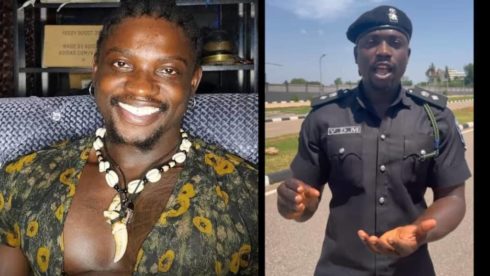Nigerian internet influencer and comedian, popularly known as VeryDarkMan, has recently faced criticism for his use of a Nigerian police uniform in a comedy skit. Known for his witty and often daring online presence, VeryDarkMan took to social media to express his regret after it was brought to his attention that his costume choice was unauthorized. Many fans initially saw the skit as another humorous post from the entertainer, but the unintended consequence of wearing the uniform has led to public and legal complications.
The Nigerian police uniform, like those in many countries, is legally protected, meaning unauthorized individuals are not allowed to wear it without explicit permission. The laws are designed to prevent impersonation, preserve public trust, and protect the sanctity of the uniformed forces. Although intended for entertainment, VeryDarkMan’s actions sparked a conversation on social media about the responsibilities influencers have when using public symbols or official attire in their content.
The Nigerian Law on Police Uniform Usage: What Influencers Need to Know
Nigeria has strict regulations surrounding the usage of official uniforms, especially for public agencies like the police. According to the Nigerian Criminal Code, wearing a police uniform without authorization is a punishable offense, as it is considered a form of impersonation. This law is in place to prevent misuse and to avoid situations where civilians could misuse the authority associated with such uniforms. The uniform represents an identity and an authority that the public is legally obligated to respect, making its unauthorized use potentially damaging to trust in the police.
For influencers like VeryDarkMan, who often rely on public symbols to make their content relatable or impactful, this incident raises a critical legal question. Many internet personalities may not be fully aware of the legal consequences of using restricted attire or symbols in their skits. This recent case highlights the importance for content creators to research and, if necessary, seek permissions before incorporating sensitive or legally protected attire in their performances.
VeryDarkMan’s Apology: “I Didn’t Know I’m Supposed to Take Permission
Following the backlash, VeryDarkMan issued a public apology, explaining that he was unaware of the legal requirements for using the police uniform. “I didn’t know I’m supposed to take permission,” he stated, expressing regret for any misunderstanding his actions may have caused. The statement came as a relief to some of his fans, who were concerned about his legal standing and the possible implications of his actions on his career.
The apology not only helped to diffuse some of the immediate tensions but also opened a dialogue about the responsibilities influencers have in educating themselves on legal boundaries. By addressing the issue head-on, VeryDarkMan attempted to minimize further public scrutiny, expressing a desire to remain compliant and respectful in future content.
Nigerian Police Force Response: Setting an Example for Future Content Creators
The Nigerian Police Force responded to the incident by reiterating its position on unauthorized use of official attire and symbols. A spokesperson emphasized that the police uniform is a sacred representation of public security and order, and its unauthorized use will not be tolerated. They warned that those who use police attire or symbols inappropriately would be subject to legal action, regardless of their intentions.
This response from the Nigerian Police serves as a strong reminder for content creators and the public at large. While creative freedom is widely respected, there are boundaries when it comes to impersonating public officials. VeryDarkMan’s case now stands as a precedent, setting an example for influencers who might consider similar creative choices. It underscores the importance of respecting the boundaries set by public institutions to maintain social order and avoid misuse.
Social Media Reactions: Fans Support and Criticize VeryDarkMan’s Actions
The incident quickly sparked a debate on social media, with fans and critics voicing mixed opinions. Some supporters defended VeryDarkMan, pointing out that many entertainers have used police uniforms in their content without repercussions. They argued that influencers often don’t have clear guidelines on legalities when creating humorous or satirical content and that this could have been an honest mistake. Many sympathized with his explanation, saying his apology demonstrated responsibility and respect for the law.
On the other hand, critics argued that ignorance of the law is not an excuse, and public figures must be extra cautious when their actions might influence others. They contended that as an influencer with a large following, VeryDarkMan should have been more aware of the implications. This controversy has highlighted the polarized views among audiences on the responsibilities of influencers and the potential impacts of their actions on society.
The Bigger Picture: Implications for Digital Content Creation in Nigeria
The issue with VeryDarkMan’s use of the police uniform extends beyond his individual case, touching on broader concerns about digital content creation in Nigeria. With the rise of social media influencers and online content creators, there is an increasing need for clarity on what is legally permissible, especially when public symbols are involved. This case underscores the need for more accessible information for digital creators on local laws and regulations, so they can avoid unintended legal issues.
As the digital space continues to expand, Nigeria’s legal framework may need to adapt to keep pace with new media and content creation trends. VeryDarkMan’s apology and subsequent media coverage may prompt authorities to establish clearer guidelines, thereby helping both the government and content creators to understand and respect each other’s boundaries. This incident serves as a reminder of the importance of compliance in the evolving digital landscape.
Table of Contents
Discover more from OGM News NG
Subscribe to get the latest posts sent to your email.














